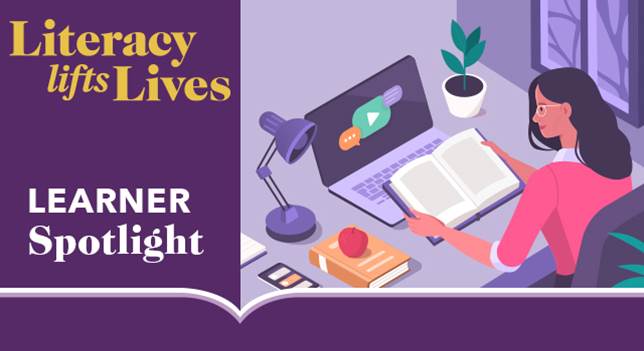Learner Spotlight: It’s Working! Literacy Council Expands Workplace Program
 Sometimes the best-laid plans do succeed.
Sometimes the best-laid plans do succeed.
This certainly is the case for the Literacy Council of Frederick County. Plans to expand its Workplace Literacy Program were given the green light last year in the form of a multi-year grant from the Maryland Department of Commerce, Office of Tourism. The Council finds itself now ready to build on success it had experienced in recent years through workplace programs designed to improve the English language literacy—and everyday life skills—of employees working in the hospitality services industry in Frederick County, made possible by support from the Tourism Council of Frederick County – Visit Frederick.
The grant started July 1, 2023, and welcomed Cohenterprises as the first new employer to join the initiative. Cohenterprises is a local, family-owned commercial land development company operating three area hotels. The Workplace Literacy Program’s Community Outreach Coordinator Andrea Ormsby, and Program Coordinator Anna Maestri, set about to create a customized curriculum and build a collaborative partnership to provide the essential training and basic skills necessary for its employees to communicate more effectively in English with customers, colleagues, and supervisors, to maintain their careers or achieve promotions, and to improve their efficiency, effectiveness, and job satisfaction.
To begin, the Literacy Council addressed the client’s priorities “by doing an assessment of the employees who had expressed interest in the classes,” Ormsby explains. “Then we followed up with Cohenterprises to recommend the number and level of classes,” based on the employees’ results. The employees came from three different hotel locations, but transportation to the training sessions’ host location is being coordinated by the employer. Ormsby says that, as part of the program’s requirements, during class time employees should receive their regular wages, “even if the time of the instruction occurs outside their shift.”
“We started this past fall with three classes lasting twelve weeks,” Maestri says, with about 15 students in all attending, “Each class was at a different level — one in basic literacy, one for low beginners, and one for high beginners. Winter classes have just begun, with two more employees joining the program.” The Workplace Instructors use a special hospitality curriculum developed by the Literacy Council that focuses on hotel-related vocabulary “so employees are better able to interact with guests and have more expressive conversations” with them.
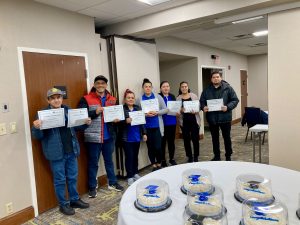 At the end of the first term “We had a celebration—sort of a graduation party—for the employees,” that was also attended by Cohenterprises General Managers and Susan Lent-Cohen, the company president, Ormsby says. The employees were given certificates and “the managers brought individual cakes for each of the participants, whom they personally recognized and congratulated. They also emphasized how they want to see their employees stay with the company and thrive in it—and in their own lives.”
At the end of the first term “We had a celebration—sort of a graduation party—for the employees,” that was also attended by Cohenterprises General Managers and Susan Lent-Cohen, the company president, Ormsby says. The employees were given certificates and “the managers brought individual cakes for each of the participants, whom they personally recognized and congratulated. They also emphasized how they want to see their employees stay with the company and thrive in it—and in their own lives.”
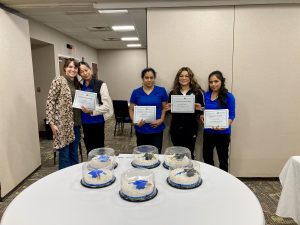 Maestri describes the experience of one employee promoted to the front desk at the start of the fall session. “He was very excited but has decided to continue taking classes to improve language skills needed for the new position. We also know that there are plans for other participant employees to be promoted to other forward-facing roles within the company.” Ormsby adds that “many employees who were hesitant in the past to engage in any kind of interaction are now showing more confidence in speaking with customers as their English skills improve.”
Maestri describes the experience of one employee promoted to the front desk at the start of the fall session. “He was very excited but has decided to continue taking classes to improve language skills needed for the new position. We also know that there are plans for other participant employees to be promoted to other forward-facing roles within the company.” Ormsby adds that “many employees who were hesitant in the past to engage in any kind of interaction are now showing more confidence in speaking with customers as their English skills improve.”
The Literacy Council is encouraging other hospitality-related businesses to implement the program while the grant is still available, says Executive Director Laurie Fisher. “We also hope to expand beyond that sector with the help of additional funding to make it financial feasible for employers.” There are many other industries that have expressed similar needs, including manufacturing, that the Council is exploring as it steps up efforts to get the word out about the Workplace Literacy Program and how it can be a benefit to both employees and employers.
“We ask employers from the very beginning what are some of the problem spots that we should address through the classes,” says Ormsby, from employees who do not take full advantage of benefits because they simply cannot understand what they are, to the isolation that many experience on the job because of their inability to communicate with their coworkers.
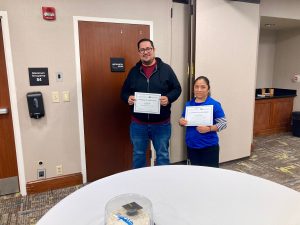 As was the case with Cohenterprises, the Council believes that the program introduces a new level of respect for employees among managers as they see them in a different light: individuals willing to put in the hard work as they strive to do better in their workplace and to change their lives. Fisher reflected on another employer, Plamondon Hospitality Partners, that has invested in their employees participation in the program for six years. “They recognized that by providing English classes at the workplace for their hospitality associates, they are opening the way to higher job satisfaction, better staff retention, promotion eligibility, and benefiting their everyday lives.”
As was the case with Cohenterprises, the Council believes that the program introduces a new level of respect for employees among managers as they see them in a different light: individuals willing to put in the hard work as they strive to do better in their workplace and to change their lives. Fisher reflected on another employer, Plamondon Hospitality Partners, that has invested in their employees participation in the program for six years. “They recognized that by providing English classes at the workplace for their hospitality associates, they are opening the way to higher job satisfaction, better staff retention, promotion eligibility, and benefiting their everyday lives.”
The Council plans to continue expanding the reach of the Workplace Literacy Program in Frederick County. Inarguably, the best part of their plan is lifting lives through literacy, while partnering with employers willing to invest in a program that mutually benefits their workers with immediate and long-term positive outcomes. And, chances are, the employees will tell their friends, you should come to work here, too!
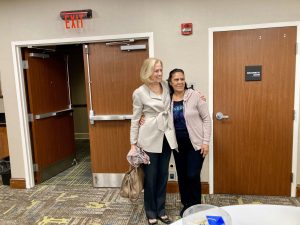 “The Workplace Literacy program offered through the Literacy Council of Frederick County is an exceptional opportunity for any employer who has team members whose first language is not English. Not only do the weekly classes offer the employees of a business with vocabulary that assists in their communication with English speaking coworkers and supervisors, but it also gives the learners a greater sense of confidence in their interactions with guests and clients of the business leading to greater customer satisfaction. Additionally, the students have great fun in class which sets the tone for a happy and productive day.”
“The Workplace Literacy program offered through the Literacy Council of Frederick County is an exceptional opportunity for any employer who has team members whose first language is not English. Not only do the weekly classes offer the employees of a business with vocabulary that assists in their communication with English speaking coworkers and supervisors, but it also gives the learners a greater sense of confidence in their interactions with guests and clients of the business leading to greater customer satisfaction. Additionally, the students have great fun in class which sets the tone for a happy and productive day.”
Susan Lent-Cohen, Business Owner, Cohenterprises
![]()



